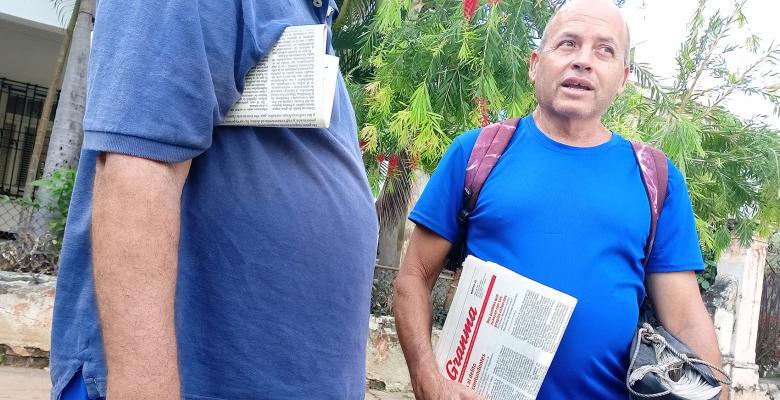The Mailman
especiales

He is of small stature and has polite manners. I see him every day walking up and down the streets of Vedado, though he does not live in the area. Each morning, he finds a way to travel from Boyeros and his Panamericano neighborhood, where he resides, to his workplace: the post office at Paseo and Línea Streets. “I travel however I can —by any available bus, an airport shuttle, a truck, or sometimes even by train because there’s one that comes from San Antonio. Commuting takes me longer than the actual work,” he says. His supervisors are flexible —he does not always arrive by 8 a.m., but he rarely misses a day, and he finishes when the job is done. His position is not behind a desk, nor does he work at a service window handling stamps, parcels, or pension payments.
Jorge García González has worked in the Cuban postal service for 38 years, with a five-year break when he pursued other activities. However, he returned to his old profession —he is the mailman for the area. At one point, he served as deputy administrator and head of distribution, but he prefers being a mail carrier, going door to door to deliver letters or, at the very least, newspapers. “There are fewer and fewer letters, unfortunately, because I love this job,” he says. But he is happy when there are letters, when he sees the sparkle of joy in the recipient’s eyes. In the face of new technologies, his profession is becoming obsolete. Jorge is a survivor of a romantic era.
“I fell in love with this job when I was just a kid, ten or eleven years old. There was a mailman back in Centro Habana, where I lived —Alberto Santurria. He’s probably passed away by now because this was many years ago, and he was already quite old then. I saw the joy people felt when they received their mail, and I started to admire this work. He was a very good person. My parents wouldn’t let me go out with anyone, but he knew I loved baseball. And the first person to take me to the Latino stadium was that mailman. He was a beloved figure in the neighborhood.”
He delivers newspapers on 17th, 19th, and 21st streets, from Paseo to D. Each day, he must distribute about 200 newspapers, which takes him two hours. Sometimes, I run into him along his route, and since we now know each other, he asks whether I prefer to receive it in hand or have it delivered to my doorstep. “Either way, I have to pass by there,” he explains. He doesn’t knock unless it’s time to collect payment —he simply slides the newspaper under the door. To have this brief conversation with him, I had to run —he moves fast. Then he returns to the post office, and if there are packages or parcels, he sets out again.
He has three children, aged 35, 26, and 16, and two grandchildren. His wife also works. This year, he turns 61, yet he maintains the agility that every good mail carrier needs. His motivation is not the salary, which is low. I slyly ask if he has any “side earnings.” He looks at me, surprised, but does not take offense: “No, just whatever someone may choose to give me when I collect payment for the newspaper or deliver a particularly heavy package.” Yet, he has never once asked or hinted for a tip. “In the past, if someone couldn’t or didn’t want to leave their home, we would collect payments for other services, make the transaction, and bring back the receipt. But now, everyone pays digitally through Transfermóvil —it’s what the country needs. It’s much more convenient and secure. Progress cannot be denied.” He pauses and insists, “As I said, I like this job. But postal services are being used less and less.”
At one point, he was recognized as an outstanding employee and received a certificate. But Jorge is an exemplary worker. He performs his duties quickly, consistently, and with kindness. He adds value; he does not subtract. He is an unsung hero of perseverance and dedication. No job is too small —within even the humblest profession, there are great men and women.
Translated by Sergio A. Paneque Díaz / CubaSí Translation Staff













Add new comment